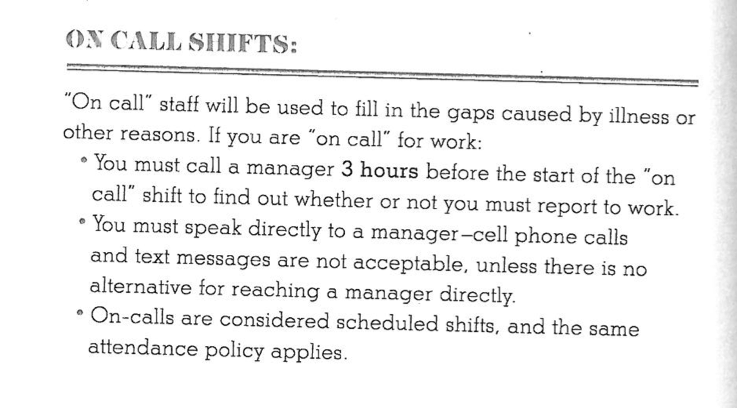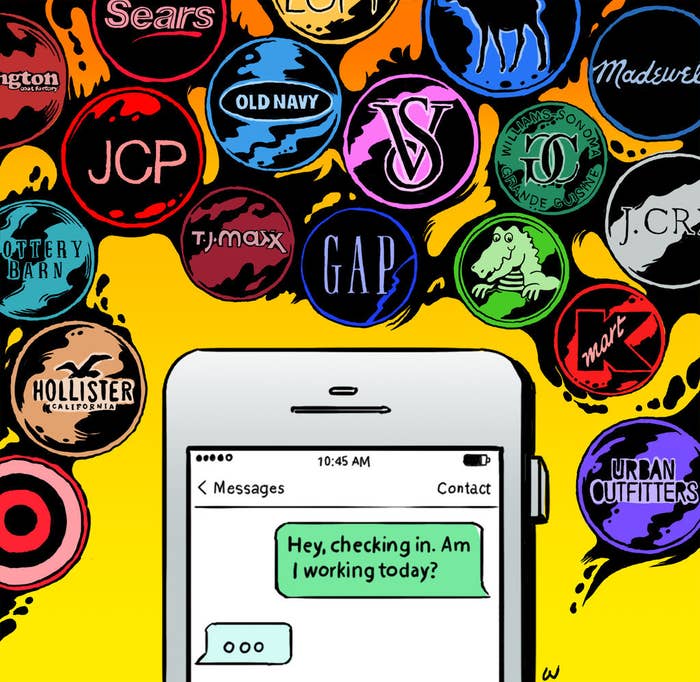
Until earlier this year, Erin Hurley worked part-time at a Bath & Body Works in Marietta, Georgia, often spending 12 hours a week smiling at shoppers and selling them body lotion and candles in scents like "Moonlight Path" and "Endless Weekend."
She would have liked more hours, and was regularly scheduled for at least twice as many. But most of those extra shifts came in the form of "call-in" work: days that an employee needs be available, often until hours before start time, with no guarantee of getting any work, or pay.
"I had to call one hour before," Hurley, 26, told BuzzFeed News in an interview. "I was about 25 to 30 minutes away, depending on traffic. They would either put me on hold or I would have to call a store several times before someone would pick up. I would be looking at my watch and starting to sweat because I would be late. They stressed to get there on time."
Hurley would work 30 hours on a good week. The next, she might clock in 10, even though still she had to be ready to come in within an hour of each call. That made it hard to find other part-time work to smooth out the unpredictable hours, and her income fluctuated wildly, although the payments for her car, student loans, credit cards, cell phone, and groceries stayed just the same.
Hurley's experience with call-in shifts has become a common tale in the retail industry. Chains keep employees on the hook up until the last minute, a move that costs them nothing and helps minimize labor costs. Software helps them understand staffing needs in real time, and evidence suggests a national chain can save tens of millions of dollars a year by keeping workers on call and canceling at the last minute, rather than paying for an hour or two of work by staffers sent home when business is slow.
This wreaks havoc on employees' lives. Staff who miss making a call in the window prior to a shift, or who do call but cannot make it to work on time, typically receive the same punishment as someone who skips a regularly scheduled shift. At Urban Outfitters, company policy says on-call shifts "are considered scheduled shifts, and the same attendance policy applies," according to a company handbook shared with BuzzFeed News.
Ray Mitchell, 28, who worked at an Urban Outfitters in Atlanta starting in 2013, said on-call scheduling "held you hostage for what you could do each day."
One can't secure other paid work or take classes during a scheduled call-in shift. But if it's canceled, the employee gets nothing in return, and they may have arranged for child care or elder care that's ultimately unnecessary. And it's far harder to budget when pay swings up and down based on a daily phone call. In some scenarios, the uncertainty can prevent people from claiming government benefits like food stamps and housing assistance because they can't accurately estimate their income.
"You lose an enormous amount of personal autonomy," said David Leimbach, a lawyer representing Victoria's Secret employees suing the company over its labor practices, including on-call scheduling.
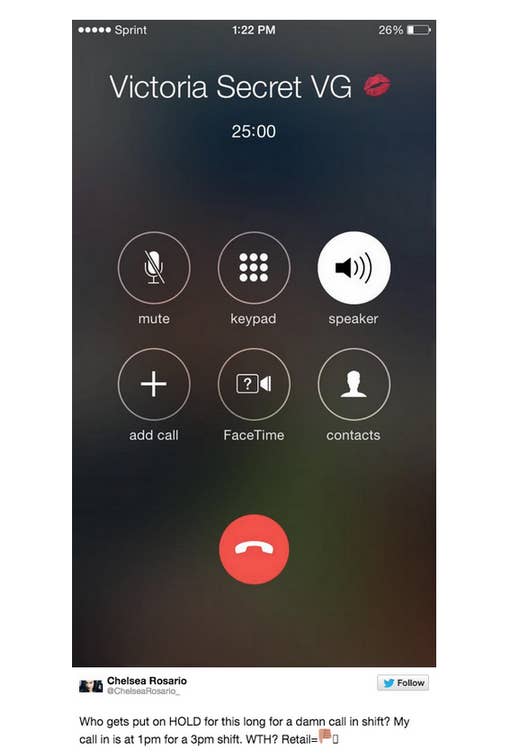
The Victoria's Secret lawsuit, taking place in California, is happening in parallel to a probe into on-call scheduling by the New York State attorney general's office. Each could have a wide-reaching impact on how retailers treat their part-timers, and are being closely watched both by employers and the worker groups pushing them to change their ways.
The California lawsuit claims in part that companies that require workers to be available on-call should pay them if their shifts are canceled, just like they would have to under state law if the person physically showed up to work but was sent home.
Historically, working "on call" has been an accepted downside of the job for doctors, police officers, and other emergency responders. They're compensated for the hassle of such shifts, which typically involve unpredictable, urgent situations. Only recently have retailers ramped up the use of such shifts, without pay, for the less pressing need for a body on hand to ring up sweater purchases and unlock fitting rooms.
This type of scheduling appears to have become extremely common. The New York attorney general's labor bureau has sent letters to 13 retailers — naming 27 different national chains they operate — seeking information about their scheduling practices because the office had "reason to believe" they were using uncompensated on-call shifts. The chains in question, from J. Crew to Sears, are all household names; collectively they operate more than 16,000 stores in North America.

The class-action lawsuit, filed by former Victoria's Secret sales clerk Mayra Casas last July, accuses the bra-and-panty powerhouse of wage theft. Lawyers for Casas, who started working at the chain in mid-2010 and continued to after the lawsuit was filed, say Victoria's Secret regularly schedules workers for mandatory on-call shifts for 15 to 20 hours a week, requiring them to telephone the store two hours ahead of time.
Victoria's Secret employees may be scheduled for more than 30 hours of work across five days in a week, but ultimately work only 10 of those hours, the complaint said. Aside from the logistical hassle of planning life around such an unpredictable schedule, it makes earning a living wage even tougher. At a $9 minimum wage, the difference between 30 scheduled hours and the 10 actually worked turns out to be earning $270 versus $90 in a week, or $1,080 against $360 in a month.
Casas, who is in her twenties, was struggling to accommodate the call-in shifts with hours from another part-time job, a juggle that rendered it nearly impossible to explore higher education, Leimbach said. Some of the policies felt wrong, so she contacted Leimbach's firm, Marlin & Saltzman, to discover if it was illegal. Both Victoria's Secret and Bath & Body Works are owned by parent company L Brands, which posted net profit of $1.04 billion for the year ended Jan. 31, a 15% increase from the previous year.
The company declined to comment, citing the ongoing litigation.
California law requires employers to pay workers who "report for work" but aren't permitted to work at least half their scheduled shift. Lawyers for Casas argue that same law, though historically applied to people who show up at a work site and are dismissed early, should also be extended to employees making those last-minute phone calls, as they are, essentially, "reporting for work."
The district judge on the case was stumped over whether "report for work" includes call-in shifts, or if that phrase requires a physical presence at a scheduled time — California's law doesn't specify. Ultimately, the judge concluded that "report for work" requires physical attendance, and dismissed the call-in reporting time claim. In April, however, he essentially paused the case and gave lawyers for Casas and another ex-Victoria's Secret worker permission to appeal that decision to the U.S. Court of Appeals for the 9th Circuit, which covers states including California, Nevada, Oregon, and Arizona, for an authoritative interpretation.
The district court said it hadn't found "a single on-point case addressing a claim similar" to Casas' reporting-time claim or "more generally, interpreting what it means to 'report for work,'" under California law. The investigation by the New York attorney general also centers around whether call-in scheduling violates state law that requires payment for each employee "who by request or permission of the employer reports for work on any day." It's unclear whether the New York AG will make retailers pay for such shifts once the investigation is complete, but it is within his office's power to do so.
The stakes in both cases are high. Lawyers for Victoria's Secret said counting call-ins under current "report for work" requirements would cause "profound legal, economic, and practical consequences" for employers and employees throughout California. Leimbach said if the 9th Circuit accepts and evaluates the appeal, "it would be the first major decision on this issue," and likely influential.
A federal judge's interpretation could be cited in other states with similar laws that entitle workers to compensation for canceled shifts, especially those using the phrase "report for work." Eight states, plus Washington, D.C., have similar laws, and while call-in scheduling has been noted as a problem by lawmakers in the handful of states like Minnesota and Oregon that are considering so-called fair workweek legislation, it's currently perfectly legal across the country.
Victoria's Secret contends that a canceled call-in shift shouldn't merit any pay, mostly because it doesn't require employees to physically show up. The company is being asked to pay people "for doing absolutely nothing compensable — for not physically reporting to any workplace and for not doing any work," the company's lawyers wrote in response to the suit.
Physically showing up is what draws the line between work and something else, the response suggests. An employee could make the phone call to check if they're needed "while still in bed" or "having lunch over an hour away," lawyers for the chain argued.
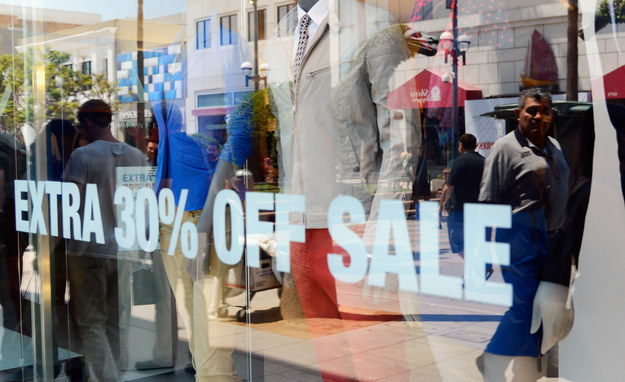
Despite the frustration and uncertainty, most low-wage workers can't afford to walk away from the companies that schedule work this way. The state of today's labor market and the eagerness of so many workers to get whatever hours they can find gives retailers the upper hand.
"I just wanted shifts, period," said Mitchell, the former Urban Outfitters employee. He started working part-time there shortly after he moved to Atlanta, until finding a steady 9-to-5 job in freight logistics.
Even if he consistently hustled for 30 hours a week, it was hard to pay rent, he said, adding that he was on food stamps for six months.
An Urban Outfitters spokesperson, in an email to BuzzFeed News, said: "We believe our policies are fully compliant with all applicable federal, state, and local laws while at the same time providing managers the flexibility to tailor schedules."
"A lot of people are working several part-time jobs, and if you're on-call, you can't work your other job at the same time," said Christine Berry, who worked as a sales associate and a manager at a Banana Republic in New Jersey between 2010 and 2014. "You lost that time you could be working elsewhere."
Many insist that in such an environment, protections historically applied to shift workers sent home ahead of schedule should be extended. "If you've been published a schedule for your hypothetical call-in shift, if it's mandatory, not optional, and you had to tailor your life around the shift, yes, you are reporting for work," said Leimbach.
He added: "Our view of these reporting time laws is that the purpose of these laws is to proscribe certain conduct, to prevent a certain kind of injustice from happening. When an employee tailors their life around a work schedule, you should adjust their wages if they're making themselves ready, willing and able to work."
Unpredictability has become an unfortunate hallmark of the low-paying, part-time jobs at America's favorite shopping and dining chains in recent years — Starbucks, Ann Taylor Loft, Club Monaco, and Banana Republic have all been lambasted in national news stories for distributing schedules just days in advance, canceling shifts at the last minute, and keeping employees on a tight leash by way of call-in scheduling. But little has compelled them and their many rivals engaging in the same practices to change.
The flood of job-seekers that emerged during the recession, along with tremendous advances in scheduling software, has provided fertile ground for chains to test the boundaries of employee availability — especially as they manage lackluster sales in stores and new costs related to the Affordable Care Act.
Craig Rowley, the global practice leader for retail at Hay Group, a management consultancy, said that beyond the ACA, the much larger factor in the rise of on-call scheduling has been the retail industry's volatile sales since the recession.
"Consumers are just unpredictable, when they will or won't buy," Rowley said. "Gas prices are at a significant low right now, which frees up a lot of money in people's hands. You'd think retail sales would be up significantly because of that — they're not. When you ask economists, nobody can tell why people aren't shopping."
"It's a challenging dance in this industry, when you have the variability and unpredictability of sales that exist in today's economy," Rowley said. "If sales aren't there, there's tremendous pressure to take expense out of the business."
Allie McCullen, 25, who worked at an Urban Outfitters in Atlanta from late 2012 through last October, said hours were determined week by week "in accordance with the previous week's sales."
"You could get a week with 20 hours and no on-call shifts," she said. "And then if sales are bad, you could have one on-call shift and that's all you get."
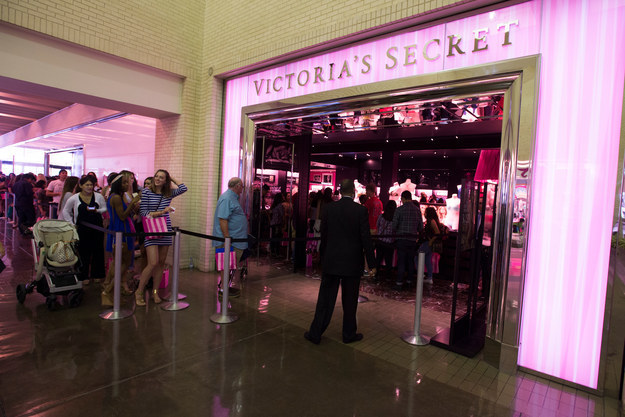
A spokesperson for the New York AG's office said the investigation, which includes Urban Outfitters, Victoria's Secret, and Bath & Body Works, is ongoing.
Between that and the California suit, retailers are holding their breath on what could become widely cited precedents.
They could also be very costly precedents. In the California case, lawyers for Victoria's Secret "conservatively" estimated that if the company were required to shell out at least two hours in wages for every call-in shift that an employee wasn't permitted to work between July 2010 and August 2014, it would cost $25.1 million.
That's just for part-timers in California, where the suit was filed. And while that estimated $25.1 million stretches across four years, California is home to just a fraction of the more than 900 Victoria's Secret stores in the U.S. (Its website lists 129 stores in the state.) That means the bill would be much higher nationally. And Victoria's Secret is far from the only large national retailer that would need to pay up.
For publicly traded retailers who have to answer to Wall Street on a quarterly basis, voluntarily giving up the savings tied to on-call scheduling is crazy talk. Most won't change unless they have to.
In one bright spot, San Francisco recently passed a "Retail Workers Bill of Rights," set to take hold next month, that's aimed at making worker schedules more predictable. Part of the legislation requires at least two hours of pay for call-in shifts unless an employer gives 24 hours' notice that it's been moved or canceled. Williams-Sonoma and Gap, both part of the New York AG's investigation, are headquartered in the city.
Pushing for a wider interpretation of reporting-time pay laws, such as the ones in New York and California, will be a stepping-stone toward a national solution, activists say, because such laws are only on the books in a handful of states. And even then, the Center for Law and Social Policy notes workers are frequently unaware they're entitled to such wages.
The stakes are high for hourly workers. For Kris Buchmann, who worked at Victoria's Secret from 2001 to 2002, getting paid for even one hour of canceled on-call shifts — she was paid $6.50 an hour back then — "would have made a huge difference," she said.
"It wouldn't have been a huge sum of money, but it would have been a big deal to me …Do you know how many packs of ramen you can buy with a dollar?"
A Victoria's Secret schedule filed in the California lawsuit:
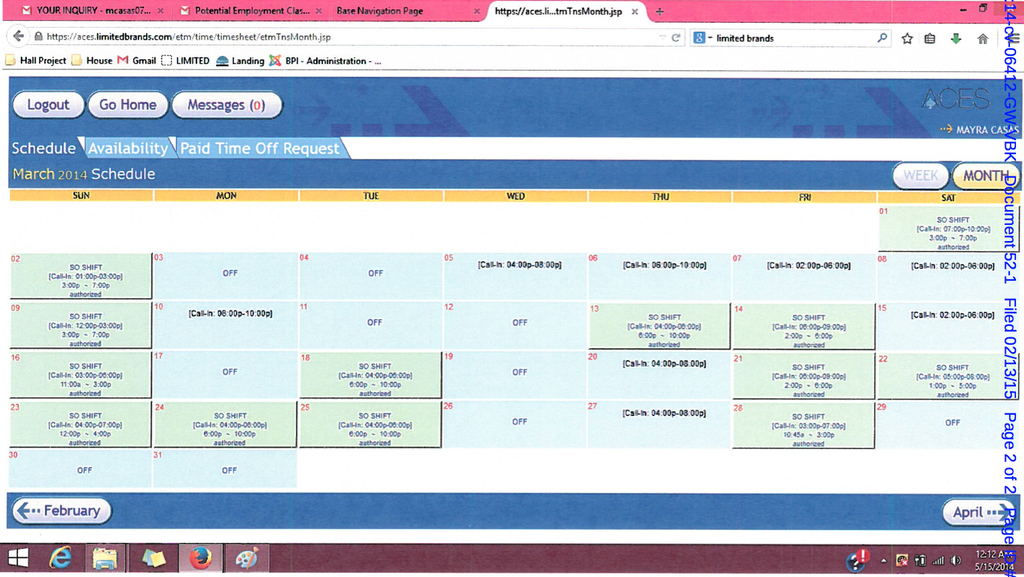
Excerpt from the Urban Outfitters handbook:
